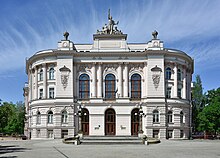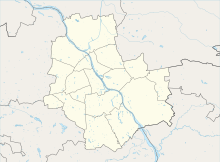Polytechnic Square
 Polytechnic Square in 2022 | |
| Former name(s) | Workers' Unity Square (1949–1989) |
|---|---|
| Namesake | Warsaw University of Technology |
| Location | Downtown, Warsaw, Poland |
| Coordinates | 52°13′12.3″N 21°00′43.7″E / 52.220083°N 21.012139°E |
| North |
|
| East | Nowowiejska Street |
| South | Polna Street |
| West | Nowowiejska Street |
| Construction | |
| Completion | 1768 |
| Other | |
| Designer | Johann Christian Schuch |
Polytechnic Square (Polish: Plac Politechniki) is an urban square and a roundabout in Warsaw, Poland, within the Downtown district. It forms an intersection of Nowowiejska, Noakowskiego, Lwowska, Śniadeckich, and Polna Streets. The square was constructed in 1768. Next to it is the Warsaw University of Technology.
History
[edit]
The square began construction in 1768, as part of the Stanisław Axis, an urban layout made of five squares and roads, connecting Warsaw with Ujazdów Castle, developed from the initiative of king Stanisław August Poniatowski.[1] It was designed by Johann Christian Schuch.[2] University of Technology Square was placed on a Royal Route, and next to the Lubomirski Ramparts, a line of fortifications erected around the city.[1]
In 1784, from the initiative of king Stanisław August Poniatowski, alongside Nowowiejska Street, the settlement of Nowa Wieś (lit. from Polish: New Village) was built, where the inhabitants of the village of Ujazdów, who were displaced due to construction of Ujazdów Castle there, were settled. It consisted of twelve houses, placed symmetrically on both sides of the street, located between Saviour Square and University of Technology Square.[3]
At the turn of the 20th century, around the northeastern side of the square, tenements were developed. Due to the presence of the Lubomirski Ramparts on the other side, it remained undeveloped until they were demolished in 1916. In 1901, at the square, the Main Building of the Warsaw University of Technology was opened.[4]

In 1887, at Polna Street, to the south of the square, the Mokotów Field Horce Race Track was opened.[5] In 1895, the first annual Great Warsaw Race, which became the most prestigious horce race in Poland, was held there.[6] The venue was closed down in 1938.[5]
A portion of the tenements were destroyed during the Second World War, and were later replaced with new ones.[4]
Between 15 and 19 December 1949, in the Warsaw University of Technology Main Building, the congress during which the Polish Workers' Party and the Polish Socialist Party merged to form the Polish United Workers' Party, a ruling socialist party in Poland, took place. To commemorative this event, on 19 December 1949, the until-then unnamed square was given the name of Workers' Unity Square (Polish: Plac Jedności Robotniczej).[4][7]
In 1964, at the square, the building of the Faculty of Electronics and Information Technology of the Warsaw University of Technology was constructed.[8]
In 1989, the square was renamed to Polytechnic Square after the nearby university.[4]
Characteristics
[edit]
Polytechnic Square is a roundabout forming an intersection of Nowowiejska, Noakowskiego, Lwowska, Śniadeckich, and Polna Streets. A tram line also runs through Nowowiejska Street.[4]
Its northeastern side, between Noakowskiego and Polna Streets, consists of multifamily residential buildings. To the northwest is the Main Building of the Warsaw University of Technology, and to the south, the building of the Faculty of Electronics and Information Technology.[4][9]
To the southern part of the square, there is a small urban park named the Marek Trzciński Park (Polish: Park im. Marka Trzcińskiego) after a 20th- and 21st-century engineer and politician.[10]
Next to the building of the Faculty of Electronics and Information Technology, there is the monument dedicated to the university professors who took part in deciphering the radio remote-control systems of the V-1 and V-2 missiles. It was designed by Marek Łypaczewski and unveiled on 30 November 1991.[11]
References
[edit]- ^ a b Eugeniusz Szwankowski: Ulice i place Warszawy. Warsaw: Państwowe Wydawnictwo Naukowe, 1970, p. 232. (In Polish).
- ^ "Jan Chrystian Szuch – ogrodnik króla Stanisława". polskieradio.pl (in Polish). 28 June 2013.
- ^ Jarosław Zieliński: Atlas dawnej architektury ulic i placów Warszawy. vol. 14. Warsaw: Biblioteka Towarzystwa Opieki nad Zabytkami, 2008, p. 11. ISBN 978-83-88372-37-7. (In Polish).
- ^ a b c d e f Encyklopedia Warszawy. Warsaw: Wydawnictwo Naukowe PWN, 1994, p. 655. ISBN 83-01-08836-2. (in Polish)
- ^ a b Andrzej Rybiec: "Wczoraj i dziś warszawskich wyścigów", Stolica, no. 2184. Warsaw, 2007. (in Polish)
- ^ Julia Właszczuk (9 October 2020). "Wielka Warszawska: Królowa polskich gonitw". vogue.pl (in Polish).
- ^ "Uchwała nr 501 Rady Narodowej m.st. Warszawy z dnia 19 grudnia 1949 r. w sprawie zmiany nazw ulic w m.st. Warszawie". mbc.cyfrowemazowsze.pl (in Polish).
- ^ "Historia. Wydział Elektroniki i Technik Informacyjnych Politechniki Warszawskiej". elka.pw.edu.pl (in Polish).
- ^ "Wydział Elektroniki i Technik Informacyjnych Politechniki Warszawskiej. Jak do nas trafić". elka.pw.edu.pl (in Polish).
- ^ Kamil Suchożebski (31 October 2014). "Wyniki konkursu na zagospodarowanie terenu centralnego Politechniki Warszawskiej". urbnews.pl (in Polish).
- ^ Irena Grzesiuk-Olszewska: Warszawska rzeźba pomnikowa. Warsaw: Wydawnictwo Neriton, 2003, p. 175. ISBN 83-88973-59-2. (in Polish)
External links
[edit] Media related to Polytechnic Square at Wikimedia Commons
Media related to Polytechnic Square at Wikimedia Commons

